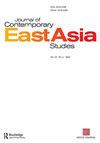Power position and Taiwan policy: how Beijing responds to Taipei’s stimuli during the Jiang Zemin and Hu Jintao periods
IF 1.4
Q1 AREA STUDIES
引用次数: 2
Abstract
ABSTRACT Cross-Strait relations between China and Taiwan have experienced wild fluctuations in the past decades. Although the existing literature has investigated the link between domestic politics and Taiwan’s mainland policy, our understanding of how politics in China impacts Beijing’s policy toward Taiwan is woefully insufficient. This article fills the gap by exploring the relation between the power position of the general secretary of the Chinese Communist Party and Beijing’s response to Taiwan’s Cross-Strait initiatives under Jiang Zemin and Hu Jintao (1989–2012). We identify 19 significant events during the period of observation that prompted official interactions, brought about changes in policy statements, and received widespread attention. The nature and intensity of China’s reaction to Taiwan’s stimuli is measured against Cross-Strait Interaction Index. We then look into power position of the general secretary by identifying whether he is in a period of power transition or power consolidation. The former (transition) entails a vulnerable power position, hence the reluctance by the general secretary to respond actively to Taiwan’s positive proposal, and the need to show aggressiveness in responding to Taiwan’s negative stimulus. The latter (consolidation) brings about a strengthened power position for the general secretary and leads to an opposite pattern of response: active engagement with Taiwan when positive messages are received, and limited retaliation when Taiwan acts provocatively. Hence the strength of the top leader in China is inversely related to the toughness of Beijing’s Taiwan policy. This finding has great theoretical and policy implications.权力地位与台湾政策:江泽民和胡锦涛时期北京如何应对台北的刺激
摘要台湾与中国大陆的跨大陆关系在过去几十年中经历了剧烈的波动。尽管现有文献调查了国内政治与台湾大陆政策之间的联系,但我们对中国政治如何影响北京对台湾政策的理解却少得可怜。本文通过探讨中国共产党总书记的权力地位与北京对江泽民和胡锦涛领导下的台湾跨大陆倡议的反应(1989–2012)之间的关系来填补这一空白。在观察期间,我们发现了19个重大事件,这些事件引发了官方互动,导致了政策声明的变化,并受到了广泛关注。中国对台湾刺激反应的性质和强度是用跨特质相互作用指数来衡量的。然后,我们通过确定总书记是处于权力过渡期还是权力巩固期来考察他的权力地位。前者(过渡)涉及一个脆弱的权力地位,因此总书记不愿积极回应台湾的积极提议,需要在回应台湾的消极刺激时表现出侵略性。后者(巩固)加强了总书记的权力地位,并导致了相反的反应模式:当收到积极信息时,与台湾积极接触,当台湾挑衅行为时,进行有限的报复。因此,中国最高领导人的实力与北京台湾政策的强硬程度成反比。这一发现具有重大的理论和政策意义。
本文章由计算机程序翻译,如有差异,请以英文原文为准。
求助全文
约1分钟内获得全文
求助全文
来源期刊

Journal of Contemporary East Asia Studies
Social Sciences-Cultural Studies
CiteScore
2.50
自引率
0.00%
发文量
10
审稿时长
6 weeks
 求助内容:
求助内容: 应助结果提醒方式:
应助结果提醒方式:


